Reuters photo
By
Muhammad Shoaib Khan
Experts call for bridging trust deficit among all stakeholders
Sustainable peace and stability in Afghanistan is in the interest of regional as well as international peace, stability and security. For the Afghan peace and reconciliation process to triumph there is a need to engage all stakeholders and bridging trust deficit.
Experts said this while speaking at a special seminar titled ‘Western engagements in Afghanistan’, organized by the Sustainable Development Policy Institute (SDPI).
Speaking at the occasion, David Vestenskov, Consultant Institute of Military Operations, Royal Danish Defense College, while explaining the Danish Stabilization Programme on trust-building and increased cooperation between Afghanistan and Pakistan, said that only a region led and region owned peace process is a sustainable solution for peaceful and stable Afghanistan. For that the first step is improved and strengthened relations between Islamabad and Kabul. He said that while Pakistan continues to play a supportive role in promoting peace in the region, the key to a socio-economically stable Afghanistan lies in the sustained engagement of the West. He said the neighboring countries of Afghanistan have immense potential to contribute to the welfare of the people in a war torn country. The coordination between the west and neighboring countries of Afghanistan to reach a shared vision for the entire region needs to be strengthened, he added.
Later, Dr. Talat Farooq, Senior Research Fellow Strategic Vision Institute (SVI) said trust is the main currency which is in very short supply in the region. First there is the need of bridging trust deficit among all stakeholders through constructive engagements and respect. She said holding Pakistan responsible for someone else’s failure in Afghanistan is factually wrong, irresponsible and not going to help the Afghan peace process. Pakistan should be engaged constructively and should be treated as a sovereign state, she added.
Dr. Salma Malik, Assistant Professor, Defense and Strategic Study Department, Quaid-e-Azam University on the occasion said that a peaceful, stable and democratic Afghanistan society is in everyone’s interest and Pakistan’s peace and stability is very much dependent on the peace and stability in Afghanistan. She said that the Afghan government and international community has to realize their responsibility of ensuring stability in the country, instead blaming Pakistan for their own failure.
Dr. Vaqar Ahmed, Joint Executive Director, SDPI on the occasion said it is important to create economic interdependencies between Afghanistan and Pakistan, where mega infrastructure projects like the TAPI pipeline and CASA-1000 electricity project are important for economic growth and trade prospects in the region. He said both countries need to revise the old Afghanistan Pakistan Transit Trade Agreement and also move towards the signing of a preferential trade agreement. Bilateral trade promotion will also require close cooperation of border related services including security and customs staff. He said that the road and rail linkages between the two countries can lead to up scaling of bilateral trade. Pakistan also needs to think how best it can offer dividends of CPEC to Afghanistan, he added.
Muhammad Shoaib Khan
Muhammad Shoaib Khan is a journalist from Pakistan and has worked with NEO TV, Independent News, PBCand The Nation.



No Comments Yet!
You can be first to comment this post!